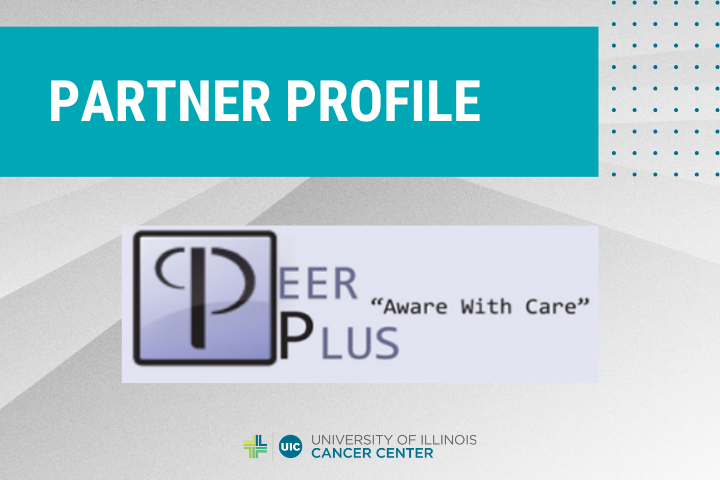
When University of Illinois Cancer Center Director Jan Kitajewski, PhD, joined other cancer center leaders and researchers in Washington to advocate for National Institutes of Health and National Cancer Institute funding, Peer Plus Founder and President Phyllis Rodgers was right there with him.
Rodgers and her community-based organization, officially named Peer Plus Education and Training Advocates, are valued and supportive partners of the Cancer Center.

About Peer Plus
Peer Plus has contracted with the Cancer Center’s Community Engagement and Heath Equity (CEHE) Office to identify and refer women in need of breast health education so they learn the importance of breast cancer screening. Peer Plus works directly with CEHE to use culturally sensitive breast health information to promote state-of-the-art 3D imaging breast cancer screening at Jackson Park Hospital on Chicago’s South Side
Peer Plus’ tailored approach to address the multifaceted issues of people in need of essential health is based on knowing, listening, and giving voice to the communities they serve.
Cancer Center Connection
A stage 3 colon cancer survivor since 2009, Rodgers, who works with community advocates on the south and west sides of Chicago, has a long history with the Cancer Center. She was a member of the Cancer Center’s Patient Brigade, a diverse group guided by the principles of community-based participatory research and patient-centered outcomes research to elevate patient and community voices.
Her history with Peer Plus goes back even further. In 2002, she and two friends were working with the Ruth M. Rothstein CORE Center, a large HIV/AIDS clinic in Chicago, to get information out about HIV screening to communities. She said they would set up events but the people who came out to deliver the information didn’t look like the community members they were talking to. Peer Plus started when Rodgers and her friends decided to deliver the information themselves at churches and community centers, encouraging people to go to the clinic to be screened and treated if they were positive for HIV.
Whole Person Focus
Then, in 2009, Rodgers was diagnosed with colon cancer and Peer Plus pivoted to focus on the whole person. The group began referring people to providers and organizations for medical care and help with other issues like food insecurity, homelessness and a lack of transportation.
Peer Plus “provides culturally sensitive programs that address the multifaceted issues of people in need of essential health, educational and psychosocial services. Peer Plus also provides non-medical education, training and related workshops,” according to its website.
Peer Plus also supports clinical research trials by encouraging those who are eligible to participate and educating them on the importance of dismantling cancer heath disparities and finding new ways to treat and cure cancer.
Peer Plus Success
For Rodgers, who estimates Peer Plus will serve about 1,000 people over the summer, success isn’t about big numbers.
“Our role is to educate as many people as possible around health disparities that directly affect underrepresented and underinsured Black and Brown people,” Rodgers said, adding her famous tagline “Aware with Care.”
